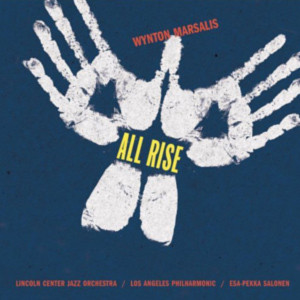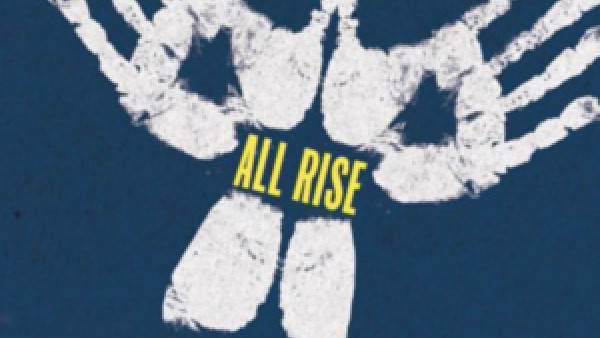All Rise in stores now!
In stores October 1, 2002, the Sony Classical release of Wynton Marsalis’ ‘All Rise’ comes more than five years after his epic oratorio ‘Blood on the Fields’ won the Pulitzer Prize for Music. ‘All Rise,’ however, cannot be considered simply a follow-up. In fact, Marsalis first began developing the ideas behind ‘All Rise’ ten years ago, and viewed ‘Blood on the Fields’ as a step in an artistic progression that would allow him to ultimately craft his 12-movement masterpiece
Wynton Marsalis’s “All Rise”: Ten Years In the Making
Two-CD, twelve-movement jazz/orchestral piece draws on the entirety of Marsalis’s diverse experience and body of work.
In stores October 1, 2002, the Sony Classical release of Wynton Marsalis’ ‘All Rise’ comes more than five years after his epic oratorio ‘Blood on the Fields’ won the Pulitzer Prize for Music. ‘All Rise,’ however, cannot be considered simply a follow-up. In fact, Marsalis first began developing the ideas behind ‘All Rise’ ten years ago, and viewed ‘Blood on the Fields’ as a step in an artistic progression that would allow him to ultimately craft his 12-movement masterpiece.
“There’s more of what I’ve learned and know and feel in ‘All Rise’ than in anything else I’ve done,” says Marsalis. The piece, calling on the performing forces of the Lincoln Center Jazz Orchestra with the Los Angeles Philharmonic Orchestra and the Paul Smith Singers/The Northridge Singers of CSUN and the Morgan State University Choir (more than 200 performers in all), blends the sounds of jazz, blues, classical and indigenous music from around the world to represent humanity’s enduring ascendance over time.
Commissioned by the New York Philharmonic, in collaboration with Jazz at Lincoln Center, ‘All Rise’ had its premiere with the orchestra in 1999.
Ten years ago, before Marsalis had ever written for classical instruments, New York Philharmonic Orchestra maestro Kurt Masur suggested that Marsalis prepare a symphonic piece for the orchestra. “At that point, I had only written for a Septet,” says Marsalis. “I hadn’t even arranged music for a big jazz band, let alone an entire orchestra. I thought he was kidding.”
Masur was indeed serious about his proposal, sensing that Marsalis’ gifts for arrangement and composition would translate well from jazz to symphony. At this early stage, Marsalis laid out the ideological themes that would drive ‘All Rise,’ and embarked on a musical quest to develop the techniques that would allow him to take on such an epic compositional challenge. Marsalis studied the ways in which classical instruments played against each other in an orchestral setting – a complicated balance that differs from jazz composition – and composed shorter classically influenced pieces to continue his development, all with an eye towards the eventual writing of ‘All Rise.’
Marsalis wrote the ballets ‘Citi Movement’ and ‘Griot New York’ and the string quartet ‘At the Octoroon Balls,’ re-visited Stravinsky’s ‘A Soldier’s Tale’ as ‘A Fiddler’s Tale,’ and composed the strikingly powerful ‘Blood on the Fields’ before beginning the score for ‘All Rise.’ All of these works were produced by Jazz at Lincoln Center except ‘Citi Movement.’
Though the piece was first performed in New York to celebrate the turn of the 21st Century in 1999, it took on its greatest meaning in 2001 in Los Angeles. The Los Angeles premiere of ‘All Rise’ had been planned for September 13, 2001 at the Hollywood Bowl, with the Sony Classical recording session a few days later. After the tragic events of September 11, the musicians had to decide whether or not to go on with the performance. Marsalis, in consult with the staff of Jazz at Lincoln Center, the musicians of the Lincoln Center Jazz Orchestra, the Los Angeles Philharmonic Orchestra conductor Esa-Pekka Salonen and the choirs, resolved that ‘All Rise’s’ themes of unity and spiritual ascendance were too important at the time to allow the performance to be cancelled. They went forward with the planned West Coast premiere on September 13, taking the stage at a very emotional time in American history, and recorded the work just a day later on September 14 and 15 despite many obstacles.
Marsalis, who is the Artistic Director of Jazz at Lincoln Center, told the audience that night, “‘All Rise’ is essentially about everyone coming together. It’s about the ‘united’ part of the United States… When we say ‘All Rise’ it is just to say that is what we do. We are born in joy, we play, we love, we make mistakes, we suffer, we beg for forgiveness, we are redeemed, and are welcomed back… We are a part of all of creation and a part of the Earth. And when we recognize that, we rise.”
Press Release by Shore Fire Media


